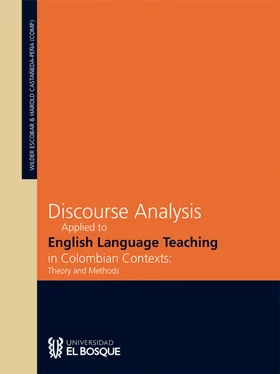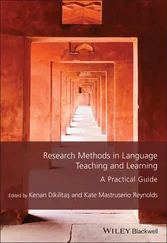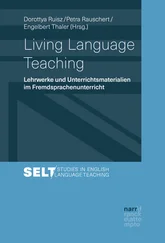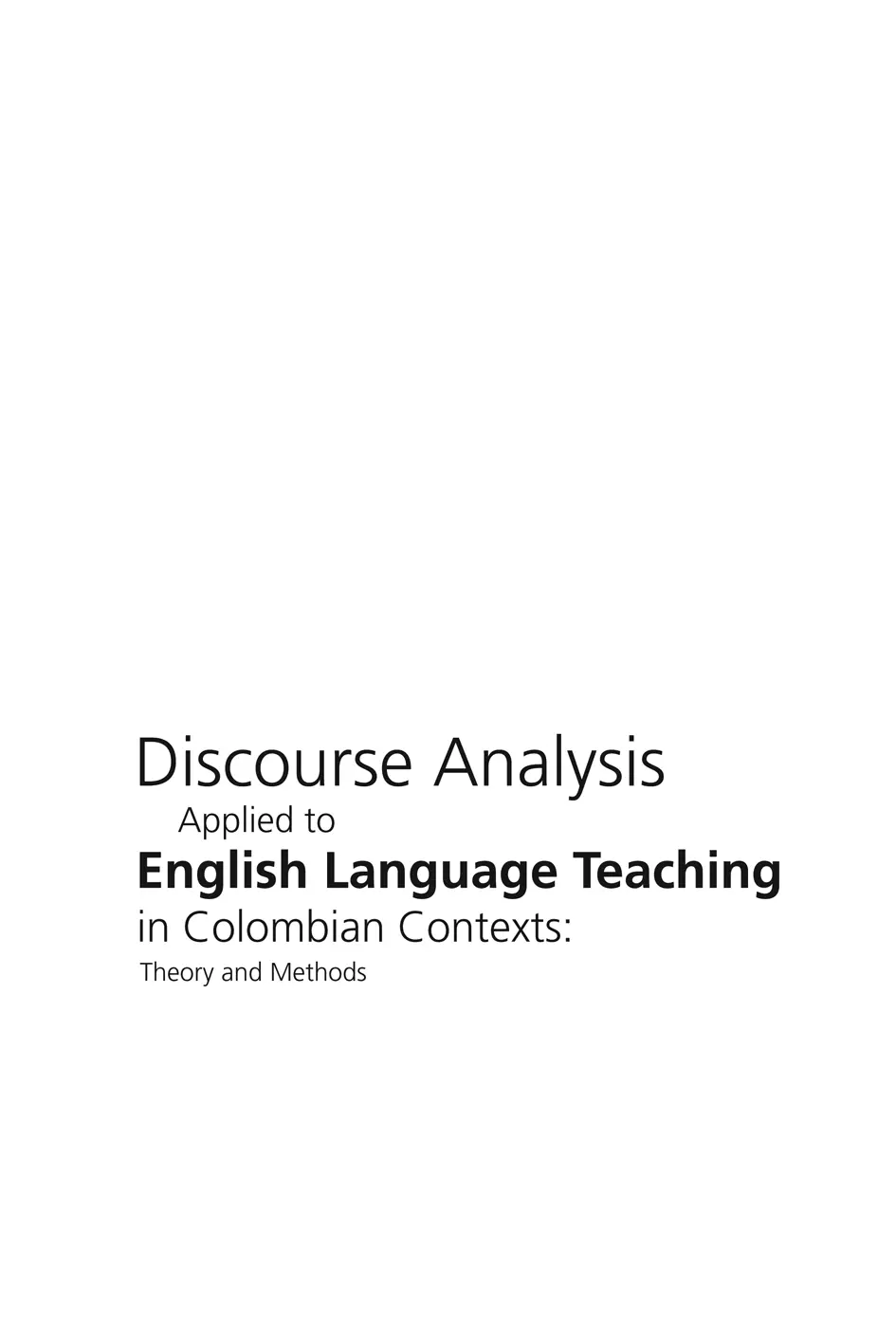
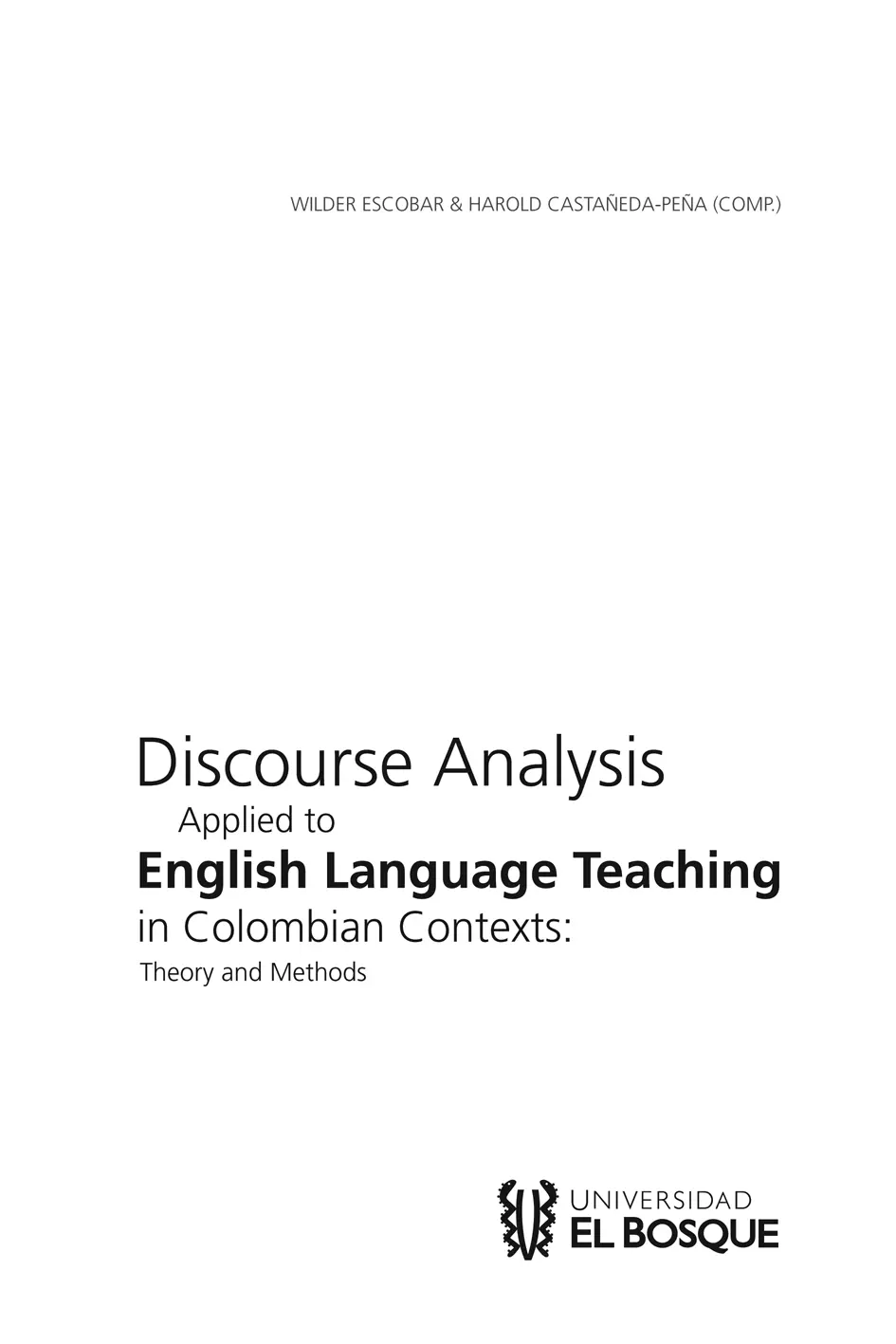
370.72 E72d
ESCOBAR ALMÉCIGA, Wilder Yesid (comp.)
Discourse analysis applied to english language teaching in colombian contexts: theory and methods / compiladores Wilder Yesid Escobar Alméciga & Harold Castañeda-Peña. Bogotá: Universidad El Bosque, 2015.
198 p.
ISBN 978-958-739-061-2
ISBN 978-958-739-062-9 (e-book)
1. Educación-Investigaciones 2. Inglés-Enseñanza Superior 3. Inglés-Colombia. Escobar, Wilder, & Castañeda-Peña, Harold, comp.

© Universidad El Bosque
© Wilder Yesid Escobar Alméciga, Harold Castañeda-Peña, Edgar lucero, Carolina Gómez Lobatón, and Lorena Caviedes.
ISBN: 978-958-739-061-2
ISBN e-book: 978-958-739-062-9
Publishing House Editorial Universidad El Bosque
Av. Cra. 9 No. 131 A – 02. Building D, 4 thfloor Bogotá, D.C., Colombia Phone number 6489000 Ext. 1395 www.uelbosque.edu.co/editorialeditorial@unbosque.edu.co
Editor Publishing House Editorial Universidad El Bosque
Francisco Javier Gutiérrez V. Mg
Scientific Committee
Adam Creighton M.A.
Craig Stokes Ph.D.
Martha Isabel Espitia M.A.
Francisco González Puentes Ph.D.
Alicia García Bejarano Ph.D.
Ruth Stella Chacón Ph.D. Candidate
Francisco Javier Gutiérrez M.A.
Copyediting: Randall Davis Barfield
Design and layout: Alexánder Castañeda
Diseño de ePub:
Hipertexto - Netizen Digital Solutions
© All rights reserved.
No part of this publication may be reproduced, stored in a retrieval system, or transmitted in any form or by any means electronic, mechanical, photocopying, recording or otherwise without the prior permission of the owners of the copyright.
INTRODUCTION
CHAPTER ONE CLASSROOM DISCOURSE ANALYSIS: OUTLINING THE FIELD
Harold Castañeda-Peña
About the Author
Introduction
Classroom language viewed as discourse
Discourse analysis in general educational settings
Discourse analysis in foreign and second language educational settings
Summary and discussion
CHAPTER TWO EXPLORING PRAGMA-GRAMMATICAL ROLES OF “DO” IN EFL STUDENTS’ SPOKEN PRODUCTION
Wilder Escobar
About the Author
Introduction
Theoretical Framework
Research Design
Data Analysis
Do in Speech Markers and Conversation Fillers
Common Socio-cultural Conventions within an Interpretive Community
Forms and Functions of Agreement and Disagreement
Word Associations
Conclusion
CHAPTER THREE DOING RESEARCH ON CLASSROOM INTERACTION: APPROACHES, STUDIES AND REASONS
Edgar Lucero
About the Author
Introduction
Language Classroom Interaction
Research on Language Classroom Interaction
Three Research Works in Language Classroom Interaction
Implications of the Three Research Works
Why Doing Research on Language Classroom Interaction?
Further Research
CHAPTER FOUR UNVEILING THE MASKED MEANINGS OF CLASSROOM INTERACTION: A CRITICAL ANALYSIS TO CLASSROOM DISCOURSE
Carolina Gómez
About the Author
Introduction
Theoretical framework
The Concept of Identity
Construction of Identity
Language and identity
Identity as language learners
Classroom interaction
Research Methodology
Instruments for data collection
Research approach
Methodology for data analysis
Results of the research experience
Conclusions
CHAPTER FIVE FROM UNDERDOGS TO IMPORTANT SPEAKERS: UNVEILING LANGUAGE LEARNERS’ IDENTITIES THROUGH PEER-APPROVAL DISCOURSES
Lorena Caviedes
About the Autor
Introduction
Language, Identity and Discourse: Theoretical Concepts
Method
Instructional design
Findings
Conclusions
Further Research
CONCLUSIONS
REFERENCES

At some point in history, humans began to discover the real, multidimensional and elaborate nature of words coming to the realization that they were not transparent, but rather, they possessed symbolic characteristics beyond their literal meaning which played an active part in the creation and transformation of realities. This meant that meaning-making and interpretation were a social and multifaceted negotiation which required boundless information from the social environment in order to make sense, not merely of the physical world around them, nor simply of the language-constituting bits and pieces, but about the self as well, especially in relation to its physical and social surroundings and its interdependence as to time and space (Gee, 1996) in a way that created individual and collective identities. Escobar (2013) defines this as:
“[…] a historical and sociocultural structure which makes the ever-changing co-formations of relationships possible between the self and the world and that, through discourse, allows us to identify, understand, conceive, construct, and accept or reject the different possibilities within a given time and space while seeking individual or collective interests. Accordingly, identity is closely and directly related to discourse since this is how individuals act and interact, position themselves and are positioned in a social place, a way of being in the world, and thus, a way to form and transform identities.” (p. 50)
Hence discourse transcends all realms of society: science, politics, religion, culture, education, psychology, language, thought, etc. Initially, and in Jørgensen & Phillips (2002)’s words, “[…]language is structured according to different patterns that people’s utterances follow when they take part in different domains of social life, familiar examples being ‘medical discourse’ and ‘political discourse’” (p. 1). However, while there are socially pre-established patterns of language use which allow us to distinguish between discourse genres, types, and ways in which language behaves according to context specificities, there are also sociocultural conventions at play in interaction which create, assign, shape, and modify meaning, and whose systematical and meticulous examination would potentially expose, on the one hand, understandings of the word and the established relations to it—inter alia beliefs, intentions, dispositions, attitudes, choices, values, positions, desires, knowledge—and on the other, the potential that discourse poses to create, maintain, and change them (Escobar 2013; Fairclough, 2003; Jørgensen & Phillips, 2002; Van Dijk, 1993). That is to say that once humans caught a glimpse of the scope of possibilities discourse presented to construct and modify people’s knowledge, ideologies, and social understandings, they saw an advantage they could use for their gain and consequently, analyzing discourse would reap numerous benefits, among others, in the following general arenas.
Initially and at an operational level, discourse contributes to the understanding of language and language behavior, factoring in prescriptive as well as ever-changing parameters to nurture understandings about speaking and writing mechanics such as the position, form, and functions of parts of speech; the configuration of language in conversations and other speech events; and changes of language use across genres, geographical regions, generations, and communities of practices. This understanding, in turn, could potentially boost language development, not only for the purposes of learning or acquiring a subsequent language, but also to enhance the communicative performance in genres and domains in one’s dominant language—of which one may not have a full command (e.g. refining texts to reach academic publishing levels or learning business vocabulary and idiomatic usage for business contexts).
Читать дальше
